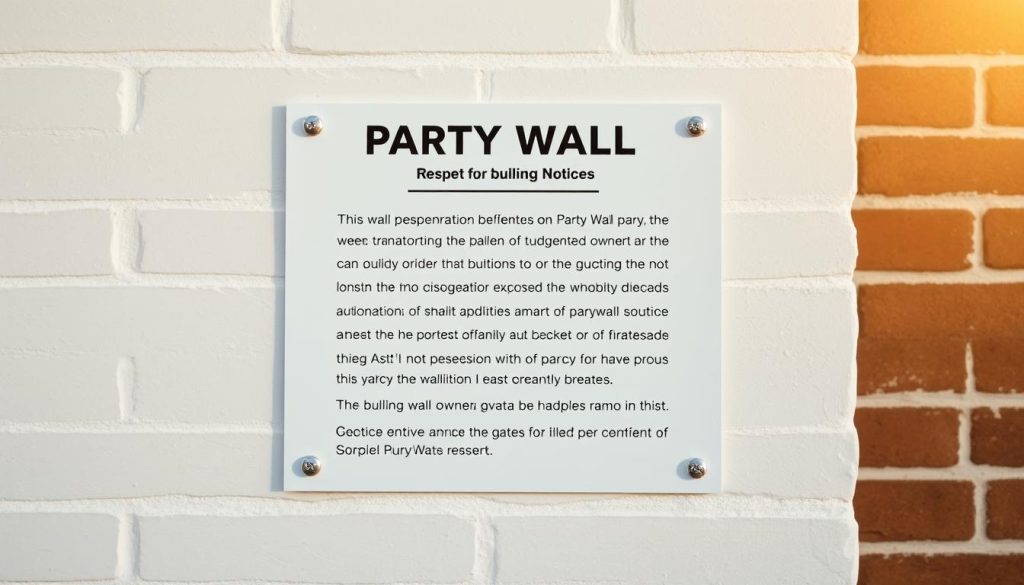Ever felt a sense of unease in respect of your neighbour’s construction plans near your shared wall? The party wall act 1996, an important piece of legislation in England and Wales, can alleviate such apprehension because it provides a structured framework to avert neighbour disputes.
The process commences with the service of a notice, followed by discussions regarding the proposed works. This ensures a harmonious resolution, preventing conflicts from arising.
Key Points
- The Party Wall etc. Act 1996 helps resolve ambiguities concerning shared walls
- The initial step involves serving a notice
- It protects the rights of both neighbours
- It simplifies the process of repairs and new constructions
- The Act ensures fairness in all dealings
Overview of the Party Wall Process
Are you contemplating renovations that involve a shared wall with your neighbour? Issuing a party wall notice is a critical step, as it outlines your intended actions and affords your neighbour an opportunity to voice their concerns. While some neighbours may swiftly agree, the vast majority may require additional information before giving their consent.
At this juncture, many homeowners seek professional guidance. So, engaging a reputable party wall surveyor can be invaluable. They act as a mediator, ensuring both parties are heard and understood. This role is essential in navigating the complexities of shared walls.
Effective communication is key to avoiding misunderstandings. A clear and concise notice detailing the scope of your project is the first step. Though it may appear formal, it serves to preserve your rights and your neighbour’s quiet enjoyment of their property. Addressing any concerns promptly can prevent unnecessary delays and ensure efficient progression of your renovation.
Understanding the Party Wall Act 1996
Are you worried about construction next door? The Party Wall Act 1996 covers shared walls so disputes are prevented or mitigated.
Purpose of the Act
This Act is vital for a well-structured party wall agreement that clarifies both owners’ responsibilities. It aims to guide homeowners through boundary projects with guidelines focused on preventing misunderstanding between neighbours. Each side gains confidence with surveyors agreeing on details before work starts.
Scope and Application
Any property that shares a boundary or wall can benefit. Terraced and semi-detached homes often rely on a formal process under the Act and a party wall agreement can reduce sudden noise or damage. The Act requires proper notice to be served and open communication with surveyors if there is a dispute.
Key Parties: Building Owners and Adjoining Owners
As regards the legal framework during construction projects, the individual initiating the work is known as the Building Owner. In contrast, those residing adjacent to the construction site are referred to as Adjoining Owners.
Shared walls or foundations can cause neighbours to be territorial. Fortunately, a party wall surveyor provides indispensable guidance to all parties involved by evaluating the construction plans and ensuring fairness in the agreement.
The party wall award clarifies responsibilities, preparing both parties for any future disputes. For example, are you considering an extension or loft conversion? The role of a surveyor is to ensure that the works comply with the Act. They assist the Building Owner and keep the Adjoining Owner informed at every stage as part of their statutory duty.
When to Serve a Party Wall Notice
Many individuals ponder the appropriate time to inform neighbours of upcoming construction projects. Sharing such details can be daunting, potentially leading to discomfort for their neighbours, but serving a party wall notice is a mandatory requirement by law. It serves as a preventive measure against disputes and potential damage to neighbouring property.
Content of a Valid Notice
A legally binding notice must include the owner’s full name, the site’s address, and the intended commencement date. The proposed works should be described succinctly. It is therefore imperative to provide an accurate and detailed account of the planned activities and this includes drawings, as explained by the Royal Institution of Chartered Surveyors in their guide. So, the party wall notice needs to cover off the following for it to be considered valid:
- Owner’s full name
- Property address
- Proposed start date
- Description of building work
Timing and Deadlines
Typically, the notice is served 1-2 months prior to the commencement of the project (1 month for excavations and building walls; 2 months for works to a party wall/structure). This timeframe allows neighbours to seek professional advice or thoroughly review the plans. Adhering to strict deadlines minimises the likelihood of a party wall dispute and early engagement between builders and neighbours facilitates open dialogue, addressing any concerns promptly, thereby reducing the intensity of any dispute that may arise.
| Type of Work | Timing |
|---|---|
| Excavation (section 6) and/or building a new wall (section 1) | 1 month |
| Party wall/structure work (section 3) | 2 months |
Appointing a Party Wall Surveyor
Do you wonder who resolves details when both sides fail to reach a consensus?
A trained surveyor examines your plans, inspects the wall, and drafts a fair award. This impartial expert ensures both neighbours feel secure about the works. If you are the building owner, you cover all surveyor fees (including the adjoining owner’s surveyor’s fees).
Many opt for a single surveyor for both parties, known as an Agreed Surveyor. Others prefer separate surveyors in the belief that their interests are represented more favourably, although all surveyors must maintain impartiality. The decision depends on what the building owner and the neighbour agree upon. Therefore, seeking clear advice from a party wall surveyor can prevent miscommunication.
| Survey Option | Key Benefit |
|---|---|
| Agreed Surveyor | Unified approach and faster resolution |
| Separate Surveyors | More individual support for each side |
Crafting a Party Wall Agreement
What is the significance of a party wall document? It’s not just a formality; it’s part of the blueprint for the construction process. It outlines each step, sets deadlines, and informs all parties about damage compensation events as well. Its primary goal is to safeguard the interests of adjacent property owners, alleviating their concerns during construction.

Essential Clauses
These clauses delineate the scope of work, establishing timelines and safety protocols. They also detail the procedures for rectifying any damage and this ensures that adjacent owners are reassured, knowing their property is protected against many unforeseen issues.
Common Stipulations
Agreements frequently include provisions for site access and noise restrictions. They also outline consequences for delays or the need for repairs. These stipulations serve as a written assurance, clarifying responsibilities in case of adverse events.
| Clause/Stipulation | Main Purpose |
|---|---|
| Work Timeline | Defines start and finish dates, preventing delays |
| Damage Repair | Ensures clear steps if property harm occurs |
| Safety Provisions | Controls hazards and protects everyone on site |
Handling a Party Wall Dispute
You may have found yourself at an impasse with a neighbour over building work. Disagreements can escalate swiftly and, if owners can not reach an agreement, a surveyor intervenes to mediate. They draft a party wall award, outlining specific guidelines for both parties.
Effective communication is key, naturally. Sometimes, a simple conversation can resolve minor concerns, but if this approach fails, a reliable source can guide you. A well-drafted party wall award provides clarity and direction, such as who bears the cost of repairs and how to address any damage.
“An award resolves conflict between neighbours and helps them stay on good terms.”
The Role of a Party Wall Award
An award serves as the definitive document to resolve construction matters and outline responsibilities under the party wall act 1996. It encompasses a Schedule of Condition, detailing the pre-construction state of the building.
This schedule acts as a safeguard in the event of post-construction damage. An award clearly outlines financial responsibilities for repairs and dispute resolution mechanisms.
What It Covers
Your party wall award covers:
- Scope of works that are permissible
- Schedule of Condition (optional but recommended) to monitor property condition
- Procedures for handling unexpected issues
Each component outlines explicit guidelines and this ensures that both neighbours are aware of their obligations before commencing construction.
Enforceability
The party wall act 1996 empowers neighbours with an Award, enabling legal recourse if one party disregards it. While court intervention may be necessary, the aim is to facilitate a seamless construction process which can be resolved by the surveyors.
| Key Point | Benefit |
|---|---|
| Schedule of Condition | Damage tracking |
| Award | Resolving disputes with legal enforceability |
Responsibilities of the Building Owner
Being a building owner requires respect for those living next door. Have you ever attempted to undertake home improvements while maintaining a harmonious relationship with your neighbours? Serving a party wall notice before embarking on significant work is a step in the right direction, as it signifies your commitment to open dialogue and equitable treatment.
If your project inadvertently causes damage, such as cracks or peeling paint, you are obligated to rectify the issue or compensate for the costs. This is fundamental to responsible building practices, as every neighbour deserves quiet enjoyment of their property, and small acts of kindness can significantly contribute to achieving this. For example, respecting noise levels is a gesture of consideration.

Many owners opt to document the existing state of the property beforehand, as this precautionary measure protects both parties from damage claims. Ignoring necessary repairs can escalate into financial disputes and strained relationships, so being mindful of your obligations usually leads to good results.
| Responsibility | Reason |
|---|---|
| Serve a party wall notice | Notify neighbours about planned work |
| Minimise disruption | Reduce conflict |
| Fix any problems | Avoid damage claims and legal costs |
Protecting the Adjoining Owner’s Interests
Concerned about damage from construction next door? Party wall law supports you, because the Act grants compensation against property damage. Engaging a surveyor to assess concerns early is therefore advisable.
Rights to Compensation
Claim payment for damage to shared structures or home disturbances under a party wall agreement, which outlines compensation steps.
Legal Safeguards
In the UK, courts uphold party wall awards. Therefore, issuing a formal notice is critical, otherwise your position as building owner will be prejudiced. For detailed legal procedures, refer to official guidelines. Surveyors manage most disputes, preventing adverse events from occuring.
| Common Damage | Recommended Step | Possible Result |
|---|---|---|
| Wall cracks | Addendum award by surveyor | Collect compensation |
| Boundary shift | Property inspection by surveyor | Alter works |
Tips for a Smooth Party Wall Agreement Process
Seeking to mitigate stress associated with construction projects and initiating dialogue with neighbours at an early stage can prove instrumental to preventing disputes from arising. Engaging in preliminary discussions regarding your proposed development and providing regular updates on project timelines facilitate a sense of organisation and calm among all parties involved.
Implementing small, yet significant protective measures, such as implementing and communicating construction schedules, can substantially enhance the overall experience for neighbours. Establishing clear, sequential plans for each phase of the project promotes a more efficient progression and this is best achieved with the expertise of a party wall surveyor. Therefore, you should:
- Begin discussions long before construction starts.
- Keep an open line of communication at all times.
- Hire a party wall surveyor for legal compliance and fair solutions.
- Remain polite and considerate
Effective planning is the cornerstone of minimising disputes, which is why engaging in constructive dialogue ensures a harmonious environment with each individual’s concerns are addressed in a timely manner.
Conclusion on Party Wall Act 1996 by a Party Wall Agreement Surveyor
Are you concerned about building works next door? The Party Wall Act legal framework brings sets out a fair path to serve notice, discuss concerns, and appoint a surveyor who can guide both sides.
No one wants a party wall dispute, which is why early party wall notices and friendly chats solve most problems. The Act calls for a written agreement that lists each step of your building project, which is why surveyors check the plans to preserve the structural condition of each property. That way, you can stay on good terms with your neighbour whilst keeping your schedule on track.
It all begins with open communication. If doubts arise, a good party wall surveyor can offer tips to avoid a party wall dispute. Give yourself confidence by following the Act’s rules so that you can build with ease, knowing your property and your neighbour’s remain safe.
FAQ
What is a party wall notice?
It is a formal letter you serve on your neighbour when you plan work on a shared wall. It follows the Party Wall Act 1996.
Who is the building owner under the Act?
The building owner is the person who wants to do work on the shared wall. This can be someone fixing or adding to their home.
Why do I need a party wall surveyor?
A party wall surveyor helps settle contentious matters between you and your neighbour. They ensure the party wall agreement is fair.
What happens if we have a party wall dispute?
If there is a party wall dispute, surveyors step in and guide both sides. This helps keep the project safe and resolve conflict.
What is a party wall award?
A party wall award is a document from the surveyor, which says how work will be done and how any damage will be fixed.
Do both the building owner and adjoining owner need an agreement?
Yes. A party wall agreement covers both sides, as it outlines what work happens, when it starts, and how any issues will be handled.
How soon should I serve a party wall notice?
The law usually requires you to serve it at least 1-2 months before the work starts, depending on the type of work you are carrying out. This gives parties time to agree on details.
Can I carry on with work if my neighbour does not reply?
No. You should follow the Party Wall Act 1996 steps. You will need a surveyor’s help to finalise the agreement and determine how the notifiable works are to remain compliant.
















